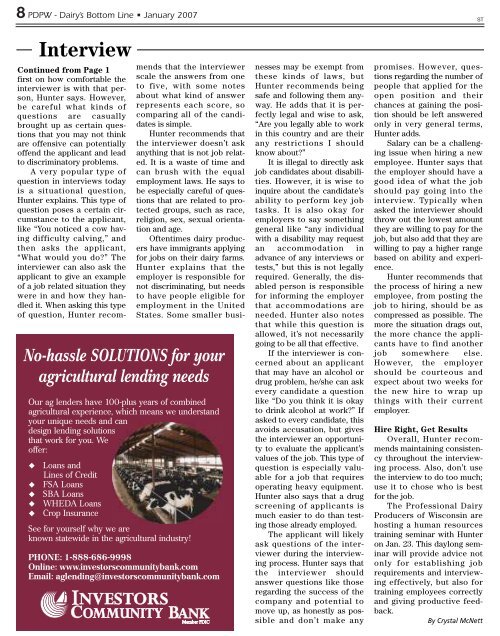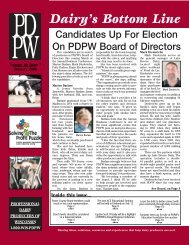Dairy's Bottom Line - Professional Dairy Producers of Wisconsin
Dairy's Bottom Line - Professional Dairy Producers of Wisconsin
Dairy's Bottom Line - Professional Dairy Producers of Wisconsin
Create successful ePaper yourself
Turn your PDF publications into a flip-book with our unique Google optimized e-Paper software.
8 PDPW - <strong>Dairy</strong>’s <strong>Bottom</strong> <strong>Line</strong> • January 2007STInterviewContinued from Page 1first on how comfortable theinterviewer is with that person,Hunter says. However,be careful what kinds <strong>of</strong>questions are casuallybrought up as certain questionsthat you may not thinkare <strong>of</strong>fensive can potentially<strong>of</strong>fend the applicant and leadto discriminatory problems.A very popular type <strong>of</strong>question in interviews todayis a situational question,Hunter explains. This type <strong>of</strong>question poses a certain circumstanceto the applicant,like “You noticed a cow havingdifficulty calving,” andthen asks the applicant,“What would you do?” Theinterviewer can also ask theapplicant to give an example<strong>of</strong> a job related situation theywere in and how they handledit. When asking this type<strong>of</strong> question, Hunter recommendsthat the interviewerscale the answers from oneto five, with some notesabout what kind <strong>of</strong> answerrepresents each score, socomparing all <strong>of</strong> the candidatesis simple.Hunter recommends thatthe interviewer doesn’t askanything that is not job related.It is a waste <strong>of</strong> time andcan brush with the equalemployment laws. He says tobe especially careful <strong>of</strong> questionsthat are related to protectedgroups, such as race,religion, sex, sexual orientationand age.Oftentimes dairy producershave immigrants applyingfor jobs on their dairy farms.Hunter explains that theemployer is responsible fornot discriminating, but needsto have people eligible foremployment in the UnitedStates. Some smaller businessesmay be exempt fromthese kinds <strong>of</strong> laws, butHunter recommends beingsafe and following them anyway.He adds that it is perfectlylegal and wise to ask,“Are you legally able to workin this country and are theirany restrictions I shouldknow about?”It is illegal to directly askjob candidates about disabilities.However, it is wise toinquire about the candidate’sability to perform key jobtasks. It is also okay foremployers to say somethinggeneral like “any individualwith a disability may requestan accommodation inadvance <strong>of</strong> any interviews ortests,” but this is not legallyrequired. Generally, the disabledperson is responsiblefor informing the employerthat accommodations areneeded. Hunter also notesthat while this question isallowed, it’s not necessarilygoing to be all that effective.If the interviewer is concernedabout an applicantthat may have an alcohol ordrug problem, he/she can askevery candidate a questionlike “Do you think it is okayto drink alcohol at work?” Ifasked to every candidate, thisavoids accusation, but givesthe interviewer an opportunityto evaluate the applicant’svalues <strong>of</strong> the job. This type <strong>of</strong>question is especially valuablefor a job that requiresoperating heavy equipment.Hunter also says that a drugscreening <strong>of</strong> applicants ismuch easier to do than testingthose already employed.The applicant will likelyask questions <strong>of</strong> the interviewerduring the interviewingprocess. Hunter says thatthe interviewer shouldanswer questions like thoseregarding the success <strong>of</strong> thecompany and potential tomove up, as honestly as possibleand don’t make anypromises. However, questionsregarding the number <strong>of</strong>people that applied for theopen position and theirchances at gaining the positionshould be left answeredonly in very general terms,Hunter adds.Salary can be a challengingissue when hiring a newemployee. Hunter says thatthe employer should have agood idea <strong>of</strong> what the jobshould pay going into theinterview. Typically whenasked the interviewer shouldthrow out the lowest amountthey are willing to pay for thejob, but also add that they arewilling to pay a higher rangebased on ability and experience.Hunter recommends thatthe process <strong>of</strong> hiring a newemployee, from posting thejob to hiring, should be ascompressed as possible. Themore the situation drags out,the more chance the applicantshave to find anotherjob somewhere else.However, the employershould be courteous andexpect about two weeks forthe new hire to wrap upthings with their currentemployer.Hire Right, Get ResultsOverall, Hunter recommendsmaintaining consistencythroughout the interviewingprocess. Also, don’t usethe interview to do too much;use it to chose who is bestfor the job.The <strong>Pr<strong>of</strong>essional</strong> <strong>Dairy</strong><strong>Producers</strong> <strong>of</strong> <strong>Wisconsin</strong> arehosting a human resourcestraining seminar with Hunteron Jan. 23. This daylong seminarwill provide advice notonly for establishing jobrequirements and interviewingeffectively, but also fortraining employees correctlyand giving productive feedback.By Crystal McNett



